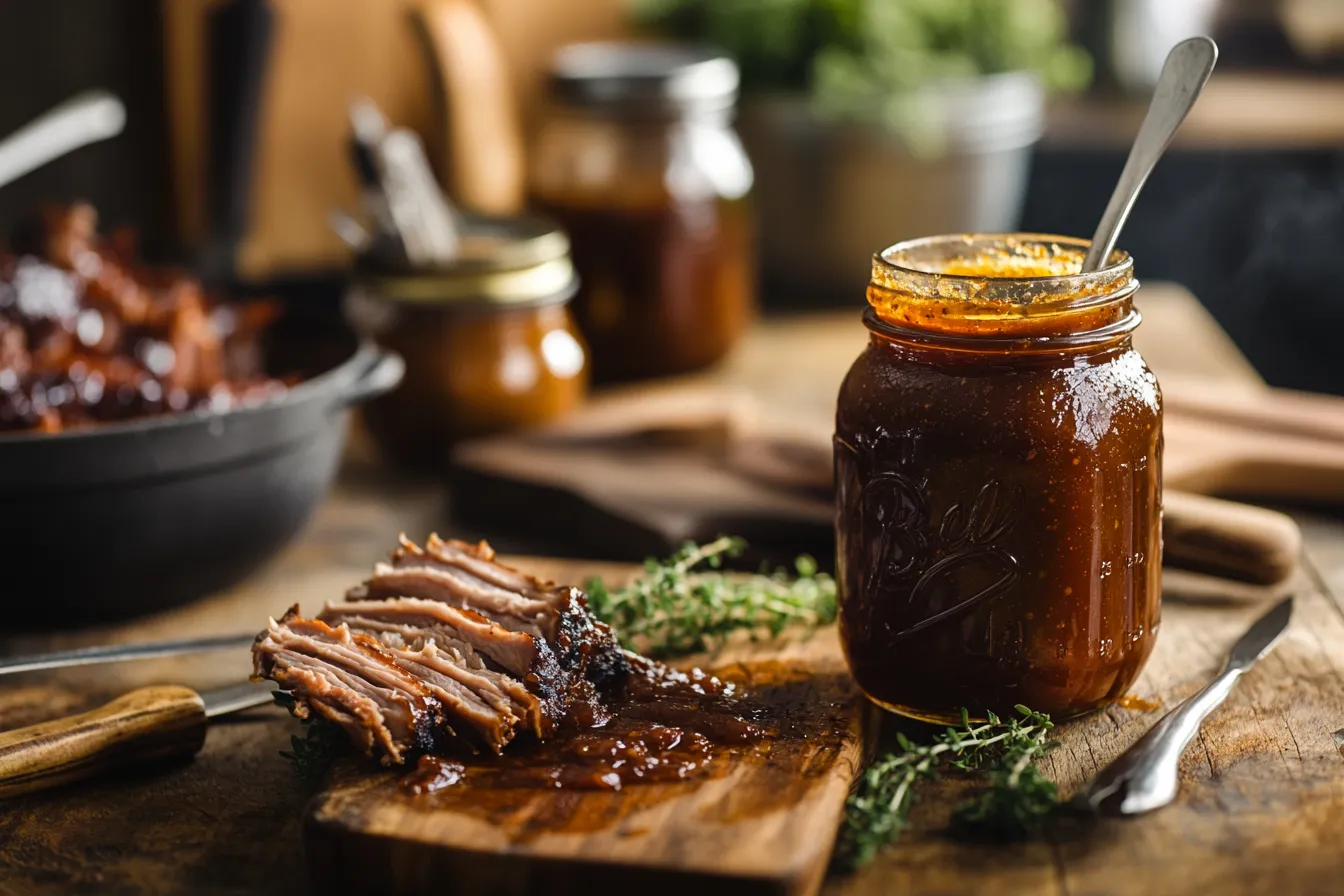Introduction to Vinegar Based BBQ Sauce
When it comes to barbecue, sauces are more than just condiments—they’re a culture. While many people are familiar with sweet, sticky, tomato-based sauces, there’s another bold contender that’s tangy, zesty, and packed with sharp flavor: vinegar based BBQ sauce. This style of sauce, rooted deeply in Carolina barbecue tradition, is gaining popularity across the country—and for good reason..Balsamic Balsamic Balsamic
Unlike its thicker, sugary cousins, vinegar based BBQ sauce cuts through the richness of meat with acidity and spice. Whether you’re basting pork shoulders, marinating chicken, or finishing off smoky ribs, this sauce offers a bright, punchy finish that enhances natural flavors instead of masking them.
Not only does it taste incredible, it’s also simple to make, requires just a handful of pantry staples, and stores beautifully. It’s ideal for those who appreciate bold flavors, authentic BBQ, and clean ingredients.
In this guide, we’ll walk you through everything you need to know—from history and regional styles to ingredients, cooking tips, food pairings, and even nutrition insights. Whether you’re a BBQ purist or a curious cook, this article will help you master vinegar based BBQ sauce like a pro.
What Makes a Great Vinegar Based BBQ Sauce
Key Ingredients
At the heart of a traditional vinegar based BBQ sauce is—you guessed it—vinegar. But not just any vinegar. Different recipes call for apple cider vinegar, white vinegar, or even red wine vinegar, each adding its own level of acidity and complexity. Most classic versions also include crushed red pepper flakes, black pepper, salt, and a touch of sugar or brown sugar for balance.
Some recipes toss in mustard, hot sauce, garlic, or Worcestershire to give the sauce a unique twist. What stays constant is the sharp tang and clear consistency that makes this sauce both distinctive and versatile.
Flavor Profile
Vinegar based sauces are sharp, acidic, and spicy, with a thinner consistency that allows it to soak into the meat, especially pulled pork or smoked brisket. This makes it ideal for “mopping” during cooking or drizzling right before serving.
The beauty of vinegar sauces lies in their balance: enough heat to wake up the palate, a zingy bite from the vinegar, and just a whisper of sweetness to mellow it all out.
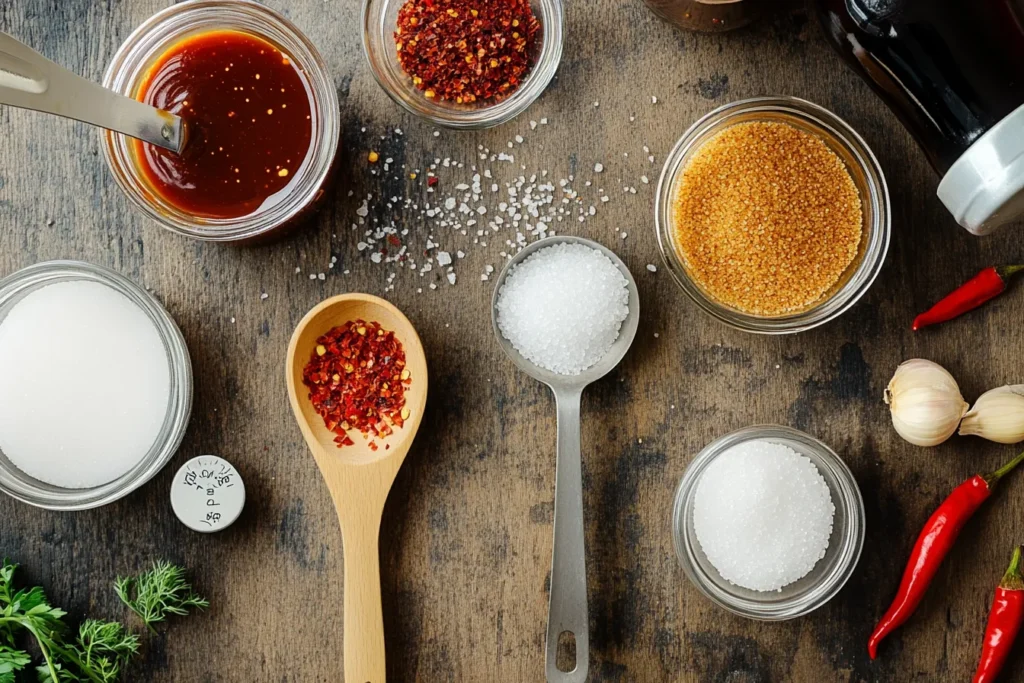
Step‑by‑Step Homemade Recipe
Classic Carolina Style Vinegar BBQ Sauce Recipe
This traditional Carolina vinegar based BBQ sauce is as straightforward as it is flavorful. With just a few ingredients, you can whip up a bold, tangy sauce that perfectly complements smoked or slow-cooked meats.
Ingredients:
- 1 cup apple cider vinegar
- ½ cup white vinegar
- 2 tablespoons brown sugar
- 1 teaspoon salt
- 1 teaspoon crushed red pepper flakes
- ½ teaspoon black pepper
- Optional: 1 teaspoon hot sauce (like Texas Pete or Tabasco)
- Optional: 1 tablespoon ketchup (for a slightly thicker finish)
Instructions:
- Combine Ingredients: In a medium-sized saucepan, combine the vinegars, sugar, salt, and peppers.
- Simmer Low and Slow: Heat over medium-low heat, stirring occasionally until sugar and salt dissolve. Do not boil—just warm through.
- Taste and Adjust: Add more red pepper flakes for heat, more sugar for sweetness, or a splash of ketchup for added body.
- Cool and Store: Let the sauce cool completely before bottling. Use a clean glass jar or squeeze bottle.
- Refrigerate: Store in the fridge for up to 3–4 weeks. Shake before using.
This version is ideal as a mop sauce for pork shoulder or brisket, or as a table sauce for sandwiches.
Ingredient Variations & Add‑Ons
One of the best things about vinegar based BBQ sauce is how adaptable it is. Here are a few popular variations you can explore:
Mustard Vinegar Sauce
- Add 2 tablespoons of yellow mustard for a tangier, deeper southern flavor, popular in South Carolina.
- Combine with honey or molasses for a sweet-spicy contrast.
Sweet & Spicy Twist
- Replace white vinegar with balsamic vinegar for a richer taste.
- Add maple syrup or honey instead of brown sugar for a more natural sweetness.
- Toss in fresh minced garlic or onion powder for aromatic depth.
Smoky Bourbon Sauce
- Mix in a splash of bourbon and liquid smoke for a smoky, boozy kick perfect for ribs.
Vegan-Friendly Version
- Most traditional vinegar sauces are naturally vegan! Just make sure any added hot sauces or Worcestershire sauces are vegan-certified (as some contain anchovies).
Pro Tips for Preparation
- Use filtered water or organic vinegar if you’re aiming for clean-label ingredients.
- Let it sit overnight—flavors deepen and blend beautifully after 12–24 hours in the fridge.
- Always shake before use, as ingredients tend to settle over time.
Vinegar Based vs. Other BBQ Sauces
Understanding the different types of BBQ sauces helps highlight why vinegar based BBQ sauce is such a standout. Let’s break down the major players in the world of barbecue sauce and see how vinegar based versions compare..Awesome Sauce
Tomato-Based BBQ Sauce
This is the most familiar type—thick, sweet, and usually rich in ketchup, molasses, or brown sugar. You’ll find it on everything from ribs to chicken in places like Kansas City and Memphis.
Comparison:
- Sweet vs. Tangy: Tomato sauces emphasize sweetness and richness, while vinegar sauces focus on acidity and sharpness.
- Texture: Tomato-based is thick and sticky; vinegar-based is thin and runny—better for mopping or marinating.
Mustard-Based BBQ Sauce
Popular in South Carolina, this sauce gets its golden hue and sharp bite from yellow mustard.
Comparison:
- Similar tanginess: Both mustard and vinegar sauces have acidic profiles.
- Spice options: Mustard versions often include turmeric, while vinegar sauces use red pepper or chili flakes for heat.
Alabama White Sauce
Made with mayo and vinegar, this unique style is creamy, tangy, and usually served with chicken.
Comparison:
- Vinegar based sauces are dairy-free and lighter, while Alabama white is creamy and more of a finishing sauce.
Texas-Style BBQ Sauce
Often bold and smoky, Texas-style sauces mix tomato paste, beef drippings, cumin, and pepper for a deep, hearty flavor.
Comparison:
- Vinegar sauces offer a lighter counterbalance to heavy meats, while Texas sauces reinforce the smoky richness.
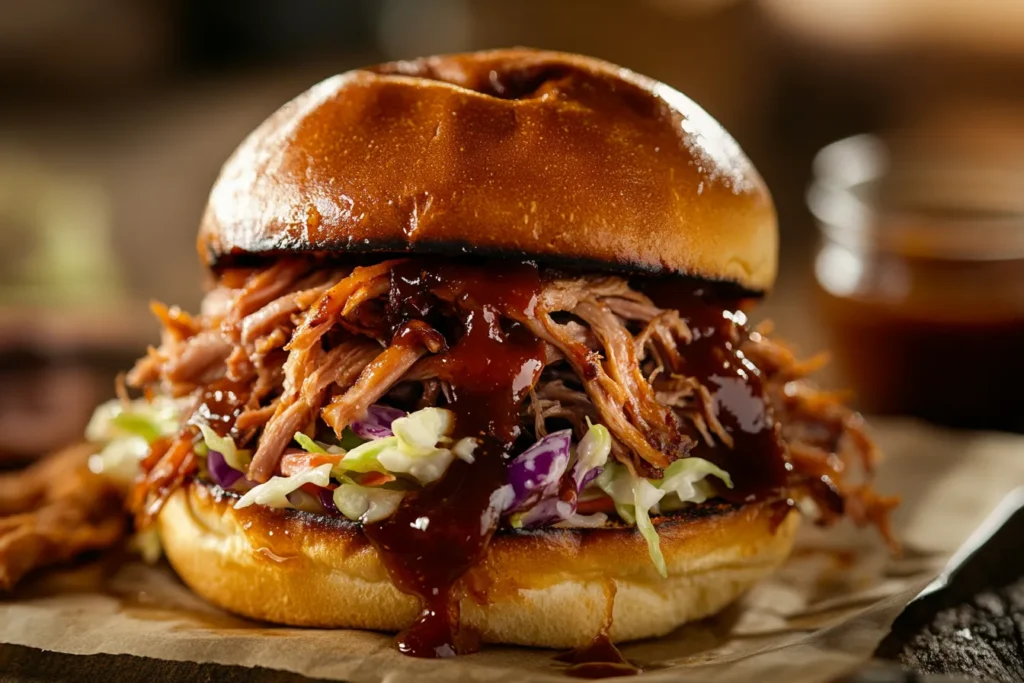
Best Foods to Pair With Vinegar Based BBQ Sauce
One of the top advantages of vinegar based BBQ sauce is its incredible versatility. It cuts through fatty meats and enhances lean ones without overpowering them.
Pulled Pork
This is the classic pairing. The acidic vinegar balances the fat of the slow-cooked pork and soaks beautifully into shredded meat. Try it on sandwiches with coleslaw for crunch and contrast.
Smoked Chicken or Turkey
Unlike sticky sauces that can burn during grilling, vinegar sauces cling lightly and add brightness. Brush it over grilled chicken thighs, turkey legs, or wings.
BBQ Ribs
Use vinegar sauce as a mop during smoking or serve it as a dipping sauce. Its bite balances the richness of well-marbled pork ribs.
Plant-Based BBQ
Grilled jackfruit, mushrooms, and tofu take well to the acidic punch of vinegar sauces. You get big flavor without overwhelming delicate textures.
Fries and Veggies
Drizzle vinegar BBQ sauce on crispy fries, roasted sweet potatoes, or grilled zucchini for a tangy snack or side dish.
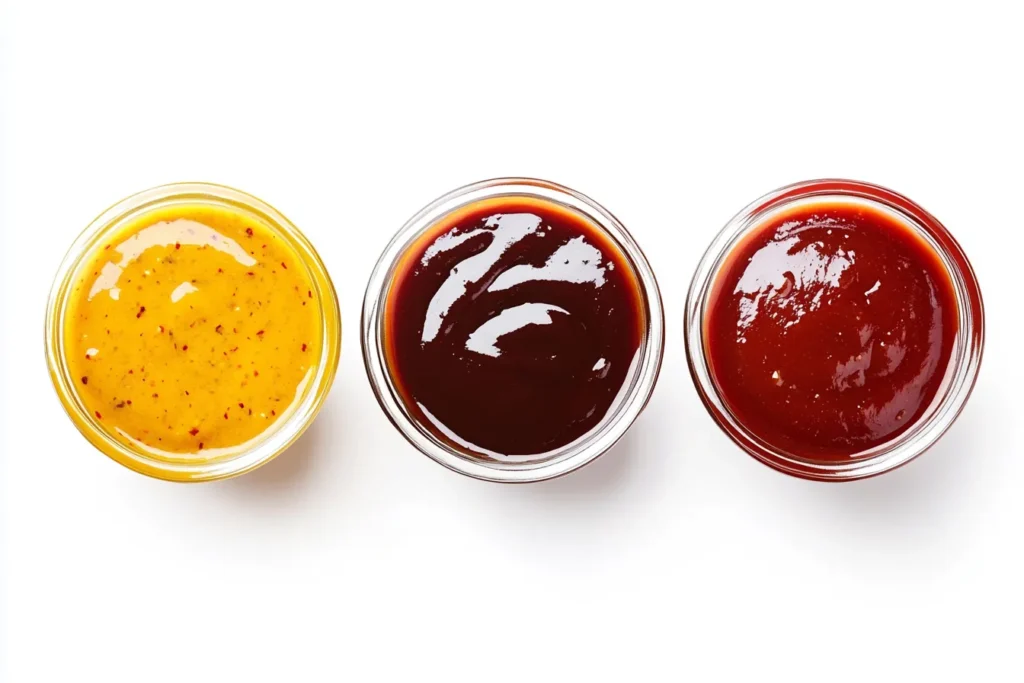
Health & Nutrition Insights
Vinegar based BBQ sauce isn’t just bold in flavor—it’s also one of the healthier options for those watching sugar, calories, and processed ingredients. Let’s look at why this style of sauce gets a thumbs up from health-conscious cooks.
Low in Calories and Sugar
Most commercial BBQ sauces contain 10–15 grams of sugar per 2 tablespoons, thanks to molasses or high-fructose corn syrup. Vinegar based sauces, by contrast, can have as little as 1–2 grams of sugar, depending on how much sweetener you use.
Typical Nutrition (per tablespoon):
- Calories: 5–10
- Fat: 0g
- Sugar: 1g or less
- Carbohydrates: ~1g
- Sodium: Varies by recipe (about 100–200mg)
This makes it an excellent choice for low-carb diets like keto, paleo, or diabetic-friendly plans.
Vinegar’s Natural Health Benefits
The primary ingredient—vinegar—has long been touted for its potential benefits:
- Aids digestion: Helps stimulate stomach acids for better food breakdown.
- May regulate blood sugar: Studies suggest vinegar can help slow carbohydrate digestion and prevent blood sugar spikes.
- Contains antioxidants: Especially if using apple cider vinegar, which retains some beneficial plant compounds.
Note: While these benefits are real, they’re most noticeable in larger amounts. A tablespoon or two of BBQ sauce won’t replace medical advice or treatment, but it’s still a great start.
Clean Ingredient Profile
Many homemade vinegar based sauces are free from preservatives, thickeners, and artificial ingredients, making them ideal for anyone trying to eat clean. You control every ingredient, which also helps avoid allergens like gluten or dairy.
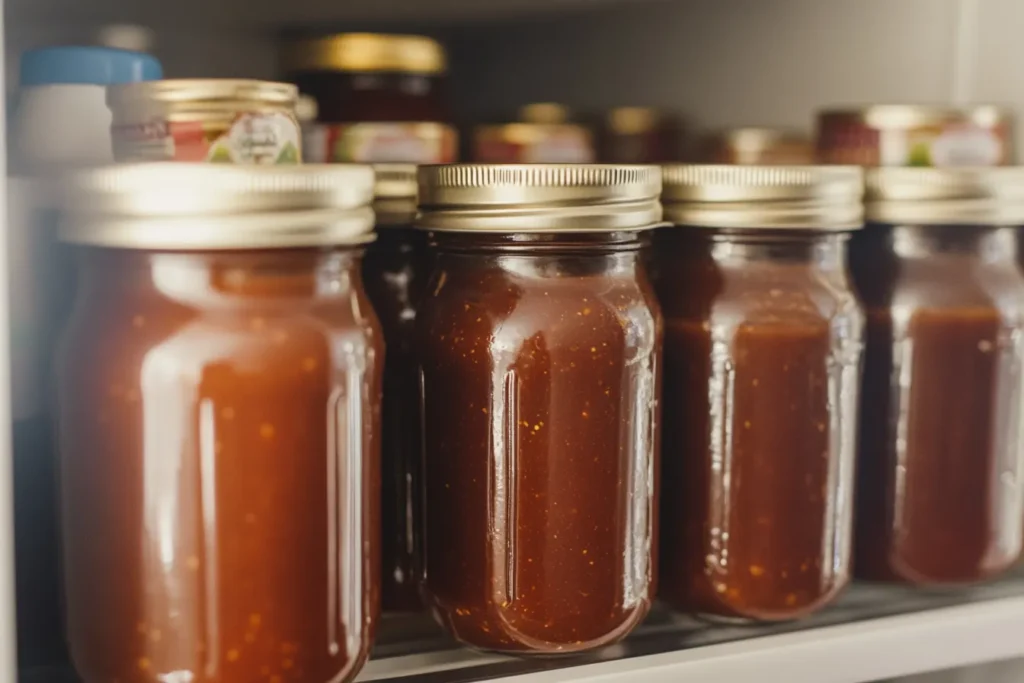
Tips for Perfecting Your Sauce
Creating a top-tier vinegar based BBQ sauce is more than tossing ingredients in a pot. Here are tips from pitmasters and food scientists alike.
Find Your Perfect Balance
- Too sour? Add more brown sugar or a spoonful of honey.
- Too spicy? Stir in a splash of apple juice or a bit of ketchup to mellow the heat.
- Too salty? Dilute with more vinegar or add a touch of water.
Let It Age
Like chili or stew, vinegar based BBQ sauce gets better with time. Make it a day ahead, and let it sit in the fridge overnight. This allows the flavors to meld, especially the spices.
Shake Before Use
Because it doesn’t contain emulsifiers or thickeners, the ingredients will separate in the bottle. Always give it a good shake before drizzling or brushing.
Storage and Shelf Life
- Refrigerated: Keeps for up to 3–4 weeks.
- Sterilized and canned: Up to 6 months (if following proper canning methods).
- Frozen: Can be frozen for up to 3 months in airtight containers.
FAQ
What type of vinegar should I use?
The most popular choice is apple cider vinegar due to its mild sweetness and fruity flavor. However, white vinegar works just as well and provides a sharper, cleaner bite. For gourmet twists, try red wine vinegar or balsamic vinegar—just note that the flavor and color will change.
How can I keep my sauce from being too bitter?
Bitterness often comes from over-boiling the vinegar or using low-quality red pepper flakes. To avoid this:
- Gently simmer, never boil the sauce.
- Use fresh spices and allow flavors to blend overnight.
- Add a small amount of sugar or honey to smooth the taste.
Can I use this sauce as a marinade?
Absolutely! The acidity in vinegar makes it an excellent meat tenderizer. It works especially well on:
- Chicken thighs
- Pork shoulder
- Skirt steak or flank steak
Let the meat marinate for 2–12 hours depending on cut size. Avoid longer marinating for delicate meats like fish.
How long does vinegar based BBQ sauce last?
When stored in a sealed container in the refrigerator, it can last 3–4 weeks. For longer storage, you can:
- Freeze it in ice cube trays or small containers for up to 3 months.
- Can it using sterilized jars and a water bath method—great for batch prepping!
Can I make a no-sugar or diabetic-friendly version?
Yes! Just omit the sugar or replace it with a sugar-free alternative like erythritol or stevia. Note that the flavor will be more acidic, so you may need to adjust spice levels for balance.
Is it safe to use on hot foods during grilling?
Definitely. Vinegar based sauces have a high acid content, which helps prevent bacterial growth. You can:
To help you dig even deeper into the history, recipes, and safety of vinegar based BBQ sauce, here are some trusted links:
- USDA Home Canning Guidelines – Safe Vinegar Use
https://nchfp.uga.edu/how/can_03/vinegar.html
Recommended anchor: “vinegar safety for home canning” - AllRecipes – Basic Vinegar BBQ Sauce Recipe
https://www.allrecipes.com/recipe/17742/vinegar-based-bbq-sauce/
Recommended anchor: “classic vinegar based BBQ sauce recipe” - Southern Living – History of Carolina Barbecue
https://www.southernliving.com/barbecue/carolina-barbecue-history
Recommended anchor: “Carolina barbecue history”
Conclusion
Vinegar based BBQ sauce may not be the most mainstream condiment, but it’s certainly one of the boldest, brightest, and most versatile. With its sharp tang, minimal ingredients, and centuries of barbecue tradition, this style of sauce offers a refreshing alternative to the thick, sugary standards many are used to.
From its deep roots in Carolina barbecue culture to its growing popularity across grills and kitchens worldwide, this sauce continues to gain fans who value simplicity, depth of flavor, and health-conscious options. Whether you’re a pitmaster perfecting your pork shoulder, a home cook looking for clean flavor, or a foodie seeking regional variety, vinegar based BBQ sauce delivers every time.
Plus, the ease of customization means you can add your own personal twist—be it mustard, bourbon, maple syrup, or heat—without losing the sauce’s defining edge.
Now that you’re armed with knowledge, recipes, and pro tips, it’s time to roll up your sleeves. Fire up that grill, make a batch, and let the tang speak for itself. And don’t forget—share it with friends, because good BBQ sauce deserves an audience.
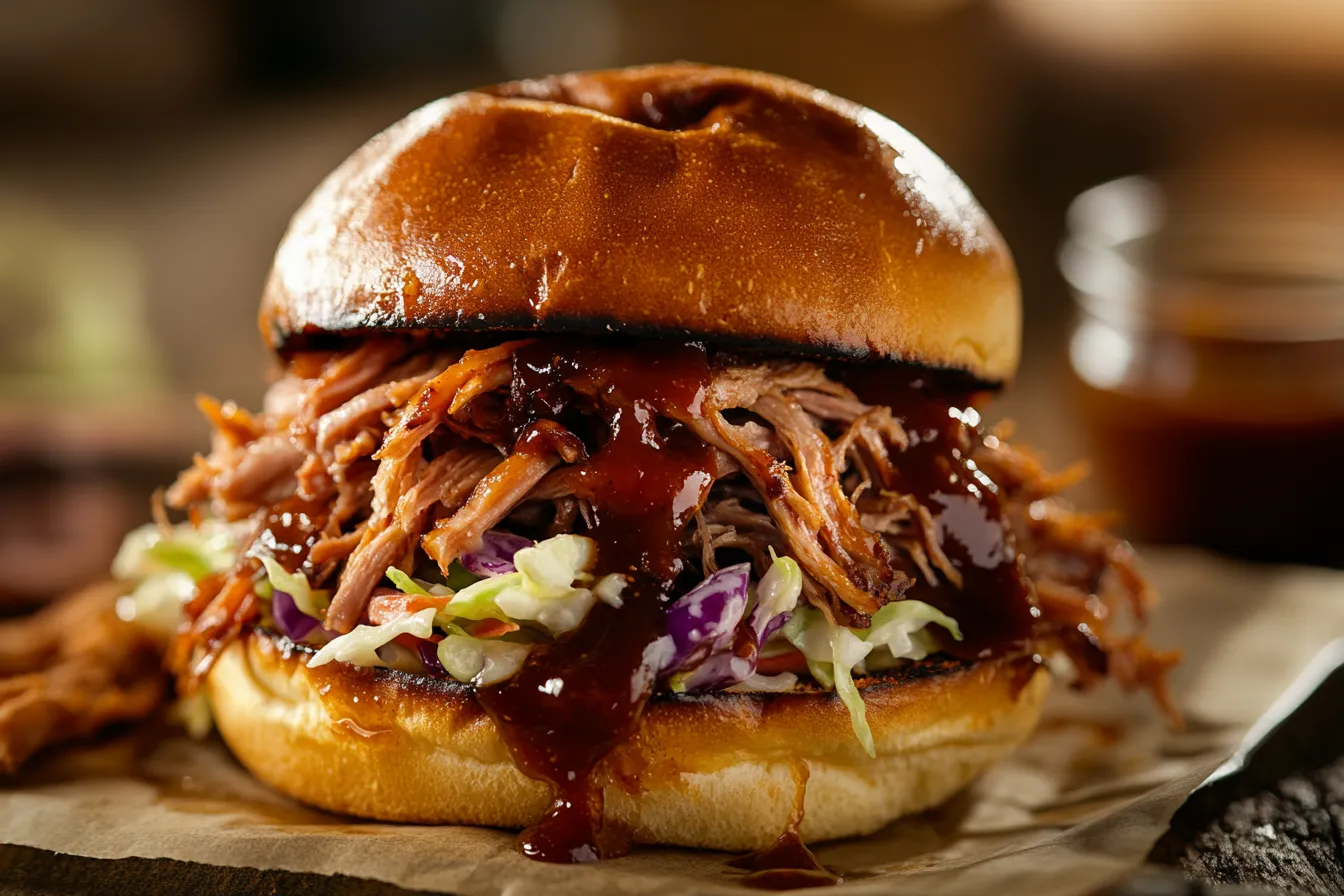
Name: Vinegar Based BBQ Sauce (Carolina-Style)
Ingredients
Equipment
Method
- Instructions:
- In a small saucepan, combine apple cider vinegar, white vinegar, brown sugar, salt, black pepper, and red pepper flakes.
- Heat over medium-low, stirring until the sugar and salt dissolve completely. Do not boil.
- Add optional ketchup or hot sauce if desired for added richness or heat.
- Remove from heat and let cool to room temperature.
- Transfer to a clean glass jar or squeeze bottle.
- Refrigerate for at least 4 hours (overnight preferred) to let the flavors develop.
- Shake well before using.
Notes
Adjust red pepper flakes to control spiciness. Add a splash of bourbon or honey for a personalized twist. Best served with pulled pork, chicken, ribs, or grilled veggies. Keeps up to 3–4 weeks in the refrigerator in a sealed container.

